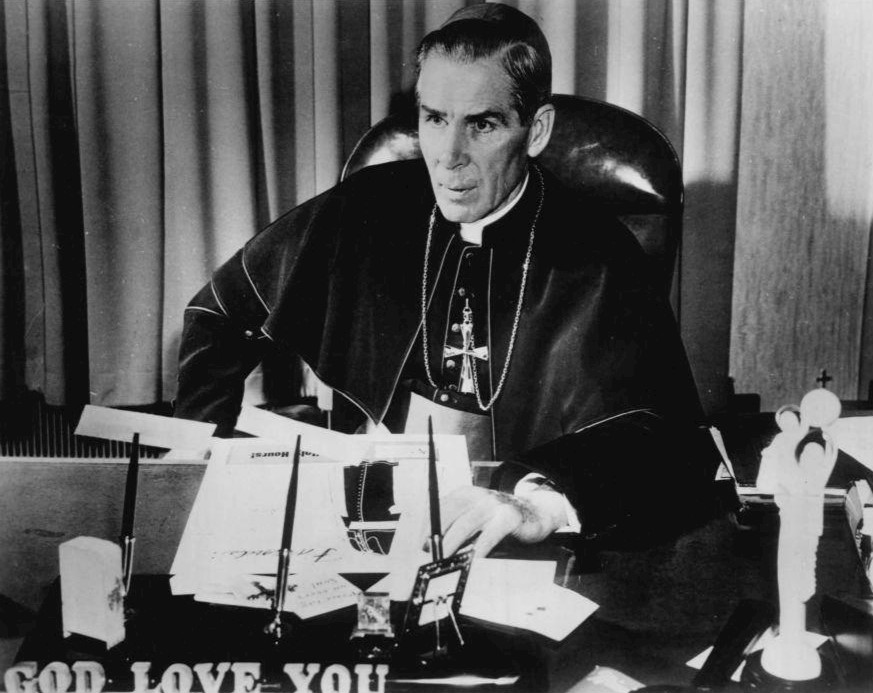Frases célebres de Fulton J. Sheen
Fulton J. Sheen: Frases en inglés
Fuente: Seven Words of Jesus and Mary: Lessons from Cana and Calvary

“A woman never tells you why she loves; she just tells you how she loves.”
Fuente: Life Is Worth Living
“[N]o man hates God without first hating himself.”
Fuente: Peace of Soul (1949), Ch. 1, p. 11 http://books.google.com/books?id=ho40AAAAMAAJ&q=%22No+man+hates+God+without+first+hating+himself%22&pg=PA11#v=onepage
“Anxiety increases in direct ratio and proportion as man departs from God.”
Fuente: Peace of Soul (1949), Ch. 2, p. 19
Fuente: Peace of Soul (1949), Ch. 2, p. 20
“A man may stand for the justice of God, but a woman stands for His Mercy.”
Fuente: Life Is Worth Living
Fuente: Peace of Soul (1949), Ch. 1, pp. 7–8
Contexto: The modern man is no longer a unity, but a confused bundle of complexes and nerves. He is so dissociated, so alienated from himself that he sees himself less as a personality than as a battlefield where a civil war rages between a thousand and one conflicting loyalties. There is no single overall purpose in his life. His soul is comparable to a menagerie in which a number of beasts, each seeking its own prey, turn one upon the other. Or he may be likened to a radio, that is tuned in to several stations; instead of getting any one clearly, it receives only an annoying static.If the frustrated soul is educated, it has a smattering of uncorrected bits of information with no unifying philosophy. Then the frustrated soul may say to itself: "I sometimes think there are two of me a living soul and a Ph. D." Such a man projects his own mental confusion to the outside world and concludes that, since he knows no truth, nobody can know it. His own skepticism (which he universalizes into a philosophy of life) throws him back more and more upon those powers lurking in the dark, dank caverns of his unconsciousness. He changes his philosophy as he changes his clothes. On Monday, he lays down the tracks of materialism; on Tuesday, he reads a best seller, pulls up the old tracks, and lays the new tracks of an idealist; on Wednesday, his new roadway is Communistic; on Thursday, the new rails of Liberalism are laid; on Friday, he-hears a broadcast and decides to travel on Freudian tracks: on Saturday, he takes a long drink to forget his railroading and, on Sunday, ponders why people are so foolish as to go to Church. Each day he has a new idol, each week a new mood. His authority is public opinion: when that shifts, his frustrated soul shifts with it.
"Bishop Sheen Writes...Communism and Tragedy," The Toledo Blade, Sunday, July 26, 1959, sec. 2, p. 5. https://www.google.com/search?hl=en&q=%22communists%20believe%20in%20the%20devil%22%20site:news.google.com/newspapers&source=newspapers&gws_rd=ssl#hl=en&q=%22Bishop+Sheen+Writes...+Communism+And+Tragedy%22+
Contexto: No one can understand Communism who does not believe in the devil. The Communists believe in the devil. The Communists organized a so-called "patriotic" church. A few brain washed were to be in charge of the churches because they were loyal to the anti-God regime.
One of the first orders given by the Communists to them was that the prayer to Prayer to Saint Michael be no longer said because it invoked the protection of St. Michael against "the wickedness and snares of the devil." As one Communist judge said: "We are those devils."
It is hard for many in the free world to believe that there are not only bad men, but evil men. Bad men steal, rape, ravage and plunder. Evil men may not always do these things, but they seek to destroy goodness, virtue, morality, decency, truth and honor. Bad men who steal admit honesty; evil men who do not steal, call dishonesty "honesty," totalitarianism "democracy," slavery "freedom." Evil men can be nice at table, polite with women, courteous in Washington, refined in London and calm in Geneva.
But the principle which guides their every move is the maxim of Lenin: every lie, trickery, knavery and deceit must be used to.
“All our anxieties relate to time.”
"Sanctifying the Moment" in Lift Up Your Heart (1950)
Contexto: All our anxieties relate to time. … The major problems of psychiatry revolve around an analysis of the despair, pessimism, melancholy, and complexes that are the inheritances of what has been or with the fears, anxieties, worries, that are the imaginings of what will be.
Fuente: Life Is Worth Living
Fuente: Seven Words of Jesus and Mary: Lessons from Cana and Calvary
“Any book which inspires us to lead a better life is a good book.”
Fuente: The Quotable Fulton Sheen: A Topical Compilation of the Wit, Wisdom, and Satire of Archbishop Fulton J. Sheen
Fuente: Seven Words of Jesus and Mary: Lessons from Cana and Calvary
